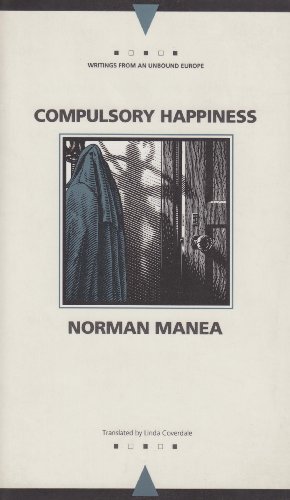Fiction that causes friction
Explore gripping fiction that causes friction with our curated list of thought-provoking books. Discover stories that challenge norms and spark debate—perfect for avid readers seeking impactful narratives.

Book
Plicul Negru
by Norman Manea
Attempting to clear up the mystery of his father's death forty years later, Tolea, an eccentric intellectual, is drawn into a web of suspicion as he pursues an elusive photographer who has left a photo archive of communist society.

Book
The Unbearable Lightness of Being
by Milan Kundera
A young woman in love with a man torn between his love for her and his incorrigible womanizing; one of his mistresses and her humbly faithful lover—these are the two couples whose story is told in this masterful novel. In a world in which lives are shaped by irrevocable choices and by fortuitous events, a world in which everything occurs but once, existence seems to lose its substance, its weight. Hence, we feel "the unbearable lightness of being" not only as the consequence of our pristine actions but also in the public sphere, and the two inevitably intertwine.

Book
The Book of Laughter and Forgetting
by Milan Kundera
Rich in its stories, characters, and imaginative range, The Book of Laughter and Forgetting is the novel that brought Milan Kundera his first big international success in the late 1970s. Like all his work, it is valuable for far more than its historical implications. In seven wonderfully integrated parts, different aspects of human existence are magnified and reduced, reordered and emphasized, newly examined, analyzed, and experienced.

Book
Identity
by Milan Kundera
There are situations in which we fail for a moment to recognize the person we are with, in which the identity of the other is erased while we simultaneously doubt our own. This also happens with couples--indeed, above all with couples, because lovers fear more than anything else "losing sight" of the loved one. With stunning artfulness in expanding and playing variations on the meaningful moment, Milan Kundera has made this situation--and the vague sense of panic it inspires--the very fabric of his new novel. Here brevity goes hand in hand with intensity, and a moment of bewilderment marks the start of a labyrinthine journey during which the reader repeatedly crosses the border between the real and the unreal, between what occurs in the world outside and what the mind creates in its solitude. Of all contemporary writers, only Kundera can transform such a hidden and disconcerting perception into the material for a novel, one of his finest, most painful, and most enlightening. Which, surprisingly, turns out to be a love story.

Book
The Winter of Our Discontent
by John Steinbeck
A New Englander learns the bitter lesson that it is not possible to be a little dishonest

Book
The North China Lover
by Marguerite Duras
A young woman growing up in Indochina experiences the humiliations and the passions of her poverty-ridden world and, like her friends, grows impatient for the experiences of adulthood while still caught up in her childhood

Book
Laughable Loves
by Milan Kundera
Milan Kundera is a master of graceful illusion and illuminating surprise. In one of these stories a young man and his girlfriend pretend that she is a stranger he picked up on the road--only to become strangers to each other in reality as their game proceeds. In another a teacher fakes piety in order to seduce a devout girl, then jilts her and yearns for God. In yet another girls wait in bars, on beaches, and on station platforms for the same lover, a middle-aged Don Juan who has gone home to his wife. Games, fantasies, and schemes abound in all the stories while different characters react in varying ways to the sudden release of erotic impulses.

Book
Madame Bovary
by Gustave Flaubert
The notorious and celebrated novel that established modern realism For this novel of French bourgeois life in all its inglorious banality, Flaubert invented a paradoxically original and wholly modern style. His heroine, Emma Bovary, a bored provincial housewife, abandons her husband to pursue the libertine Rodolphe in a desperate love affair. A succès de scandale in its day, Madame Bovary remains a powerful and scintillating novel. This Penguin Classics edition is translated with notes and an introduction by Geoffrey Wall. It includes a preface by Michele Roberts. For more than seventy years, Penguin has been the leading publisher of classic literature in the English-speaking world. With more than 1,700 titles, Penguin Classics represents a global bookshelf of the best works throughout history and across genres and disciplines. Readers trust the series to provide authoritative texts enhanced by introductions and notes by distinguished scholars and contemporary authors, as well as up-to-date translations by award-winning translators.

Book
The JOKE
by Milan Kundera
All too often, this brilliant novel of thwarted love and revenge miscarried has been read for its political implications. Now, a quarter century after The Joke was first published and several years after the collapse of the Soviet-imposed Czechoslovak regime, it becomes easier to put such implications into perspective in favor of valuing the book (and all Kundera 's work) as what it truly is: great, stirring literature that sheds new light on the eternal themes of human existence. The present edition provides English-language readers an important further means toward revaluation of The Joke. For reasons he describes in his Author's Note, Milan Kundera devoted much time to creating (with the assistance of his American publisher-editor) a completely revised translation that reflects his original as closely as any translation possibly can: reflects it in its fidelity not only to the words and syntax but also to the characteristic dictions and tonalities of the novel's narrators. The result is nothing less than the restoration of a classic.

Book
The House of the Spirits
by Isabel Allende
Here, in an astonishing debut by a gifted storyteller, is the magnificent saga of proud and passionate men and women and the turbulent times through which they suffer and triumph. They are the Truebas. And theirs is a world you will not want to leave, and one you will not forget. Esteban -- The patriarch, a volatile and proud man whose lust for land is legendary and who is haunted by his tyrannical passion for the wife he can never completely possess. Clara -- The matriarch, elusive and mysterious, who foretells family tragedy and shapes the fortunes of the house of the Truebas. Blanca -- Their daughter, soft-spoken yet rebellious, whose shocking love for the son of her father's foreman fuels Esteban's everlasting contempt... even as it produces the grandchild he adores. Alba -- The fruit of Blanca's forbidden love, a luminous bearty, a fiery and willful woman... the family's break with the past and link to the future.

Book
Compulsory Happiness
by Norman Manea
In cool, precise prose, and with an unerring sense of the absurd, Norman Manea's four novellas create a picture of everyday life in a grotesque police state, expressing terror and hope, fear and solidarity, the humorous triviality of the ordinary, and the painful search for an ideal.

Book
As I Lay Dying
by William Faulkner
A true 20th-century classic from the Nobel Prize-winning author of The Sound and the Fury: the famed harrowing account of the Bundren family’s odyssey across the Mississippi countryside to bury Addie, their wife and mother. As I Lay Dying is one of the most influential novels in American fiction in structure, style, and drama. Narrated in turn by each of the family members, including Addie herself as well as others, the novel ranges in mood from dark comedy to the deepest pathos. “I set out deliberately to write a tour-de-force. Before I ever put pen to paper and set down the first word I knew what the last word would be and almost where the last period would fall.” —William Faulkner on As I Lay Dying This edition reproduces the corrected text of As I Lay Dying as established in 1985 by Noel Polk.

Book
Love, etc.
by Julian Barnes
Twice shortlisted for the Booker Prize, Julian Barnes continues to reinvigorate the novel with his pyrotechnic verbal skill and playful manipulation of plot and character. In Love, etc. he uses all the surprising, sophisticated ingredients of a delightful farce to create a tragicomedy of human frailties and needs. After spending a decade in America as a successful businessman, Stuart returns to London and decides to look up his ex-wife Gillian. Their relationship had ended years before when Stuart’s witty, feckless, former best friend Oliver stole her away. But now Stuart finds that the intervening years have left Oliver’s artistic ambitions in ruins and his relationship with Gillian on less than solid footing. When Stuart begins to suspect that he may be able to undo the results of their betrayal, he resolves to act. Written as an intimate series of crosscutting monologues that allow each character to whisper their secrets and interpretations directly to the reader, Love, etc. is an unsettling examination of confessional culture and a profound refection on the power of perspective.

Book
The Golden Notebook
by Doris Lessing
Anna is a writer, author of one very successful novel, who now keeps four notebooks. In one, with a black cover, she reviews the African experience of her earlier year. In a red one she records her political life, her disillusionment with communism. In a yellow one she writes a novel in which the heroine reviles part of her own experience. And in the blue one she keeps a personal diary. Finally, in love with an American writer and threatened with insanity, Anna tries to bring the threads of all four books together in a golden notebook.

Book
Nightwood
by Djuna Barnes
Nightwood, Djuna Barnes' strange and sinuous tour de force, "belongs to that small class of books that somehow reflect a time or an epoch" (Times Literary Supplement). That time is the period between the two World Wars, and Barnes' novel unfolds in the decadent shadows of Europe's great cities, Paris, Berlin, and Vienna—a world in which the boundaries of class, religion, and sexuality are bold but surprisingly porous. The outsized characters who inhabit this world are some of the most memorable in all of fiction—there is Guido Volkbein, the Wandering Jew and son of a self-proclaimed baron; Robin Vote, the American expatriate who marries him and then engages in a series of affairs, first with Nora Flood and then with Jenny Petherbridge, driving all of her lovers to distraction with her passion for wandering alone in the night; and there is Dr. Matthew-Mighty-Grain-of-Salt-Dante-O'Connor, a transvestite and ostensible gynecologist, whose digressive speeches brim with fury, keen insights, and surprising allusions. Barnes' depiction of these characters and their relationships (Nora says, "A man is another persona woman is yourself, caught as you turn in panic; on her mouth you kiss your own") has made the novel a landmark of feminist and lesbian literature. Most striking of all is Barnes' unparalleled stylistic innovation, which led T. S. Eliot to proclaim the book "so good a novel that only sensibilities trained on poetry can wholly appreciate it." Now with a new preface by Jeanette Winterson, Nightwood still crackles with the same electric charge it had on its first publication in 1936.

Book
Nadja
by André Breton
"Nadja, " originally published in France in 1928, is the first and perhaps best Surrealist romance ever written, a book which defined that movement's attitude toward everyday life. The principal narrative is an account of the author's relationship with a girl in teh city of Paris, the story of an obsessional presence haunting his life. The first-person narrative is supplemented by forty-four photographs which form an integral part of the work -- pictures of various "surreal" people, places, and objects which the author visits or is haunted by in naja's presence and which inspire him to mediate on their reality or lack of it. "The Nadja of the book is a girl, but, like Bertrand Russell's definition of electricity as "not so much a thing as a way things happen, " Nadja is not so much a person as the way she makes people behave. She has been described as a state of mind, a feeling about reality, k a kind of vision, and the reader sometimes wonders whether she exists at all. yet it is Nadja who gives form and structure to the novel.

Book
Women in Love
by David Herbert Lawrence
Two of D. H. Lawrence's most renowned novels-now with new packages and new introductions Widely regarded as D. H. Lawrence's greatest novel, "Women in Love" continues where "The Rainbow" left off, with the third generation of the Brangwens. Focusing on Ursula Brangwen and her sister Gudrun's relationships-the former with a school inspector and the latter with an industrialist and then a sculptor-"Women in Love" is a powerful, sexually explicit depiction of the destructiveness of human relations.

Book
Sons and Lovers
by David Herbert Lawrence
D.H. Lawrence's great autobiographical novel is a provocative portrait of an artist torn between love for his possessive mother and desire for two young beautiful women. Set in the Nottinghamshire coal fields of Lawrence's own boyhood, the story of young Paul Morel's growing into manhood in a British working-class family rife with conflict reveals both an inner and an outer world seething with intense emotions. Gertrude is Paul's puritanical mother who concentrates all her love and attention on her son Paul. She nurtures his talents as a painter - and when she broods that he might marry someday and desert her, he swears he will never leave her. Inevitably, Paul does fall in love, but with two women - and is unable to choose between them. Written early in Lawrence's literary career, Sons and Lovers possesses all the powers of description, insistent sensuality, and scathing social criticism that are the special hallmarks of his genius. "A work of striking originality," writes the critic F.R. Leavis, by "the greatest creative writer in English of our time." Book jacket.

Book
Of Human Bondage
by W. Somerset Maugham
A masterpiece of modern literature that mirrors Maugham’s own career. Of Human Bondage is the first and most autobiographical of Maugham's novels. It is the story of Philip Carey, an orphan eager for life, love and adventure. After a few months studying in Heidelberg, and a brief spell in Paris as a would-be artist, Philip settles in London to train as a doctor. And that is where he meets Mildred, the loud but irresistible waitress with whom he plunges into a formative, tortured and masochistic affair which very nearly ruins him.


Book
The Mill on the Floss
by George Eliot
New chronology and updated further reading. Edited with an Introduction by A. S. Byatt.

Book
To the Lighthouse
by Virginia Woolf
The novel that established Virginia Woolf as a leading writer of the twentieth century, To the Lighthouse is made up of three powerfully charged visions into the life of one family living in a summer house off the rocky coast of Scotland. As time winds its way through their lives, the Ramseys face, alone and simultaneously, the greatest of human challenges and its greatest triumph-the human capacity for change. A moving portrait in miniature of family life, it also has profoundly universal implications, giving language to the silent space that separates people and the space that they transgress to reach each other.

Book
Tropic of Cancer
by Henry Miller
The account of a young writer and his friends in free-wheeling Paris.

Book
Henry and June
by Anaïs Nin
A year in the life (1931-1932) of writer Anais Nin when she met Henry Miller and his wife June.

Book
The Left Hand of Darkness
by Ursula K. Le Guin
50TH ANNIVERSARY EDITION—WITH A NEW INTRODUCTION BY DAVID MITCHELL AND A NEW AFTERWORD BY CHARLIE JANE ANDERS Ursula K. Le Guin’s groundbreaking work of science fiction—winner of the Hugo and Nebula Awards. A lone human ambassador is sent to the icebound planet of Winter, a world without sexual prejudice, where the inhabitants’ gender is fluid. His goal is to facilitate Winter’s inclusion in a growing intergalactic civilization. But to do so he must bridge the gulf between his own views and those of the strange, intriguing culture he encounters... Embracing the aspects of psychology, society, and human emotion on an alien world, The Left Hand of Darkness stands as a landmark achievement in the annals of intellectual science fiction.